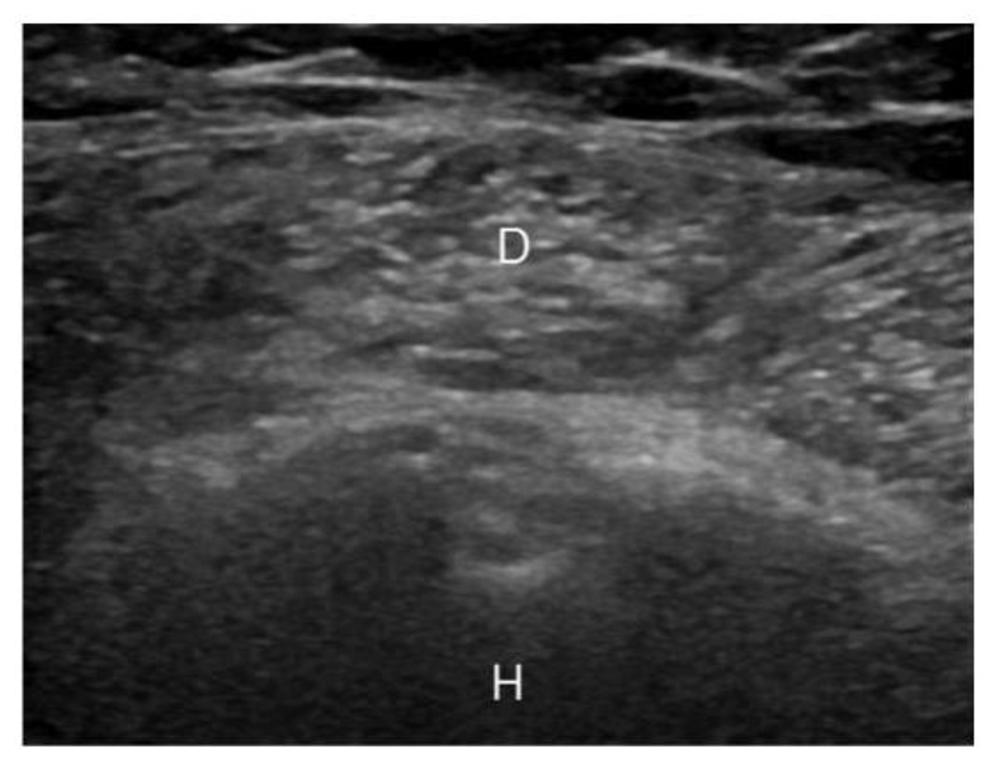Shoulder “Brightness” on Ultrasound May Be a Sign of Diabetes
Radiologists accurately identified diabetic status in 89 percent of patients.

A shoulder muscle that appears unusually bright on ultrasound (US) may be a warning sign of diabetes, according to a study being presented at RSNA 2018.
More than 10 years ago, musculoskeletal radiologist Steven B. Soliman, DO, from Henry Ford Hospital in Detroit, began noticing a pattern when images of the deltoid muscle appeared bright on US.
“Every time we would ask one of these patients if they were diabetic, they would say ‘yes’ or they would tell us they were borderline and not taking any medications,” Dr. Soliman said.
The observations prompted Dr. Soliman and colleagues at Henry Ford to conduct a study to see if the echogenicity of the shoulder muscle could be predictive of diabetes. The results revealed that by using the echogenicity of the muscle, radiologists were able to predict type 2 diabetes in almost nine out of 10 patients.
Brightness on US also was an accurate predictor of pre-diabetes, which could allow for earlier interventions.
Researchers Surprised By Accuracy of Shoulder Reads
For the study, Dr. Soliman and colleagues compiled 137 shoulder US examinations from patients with type 2 diabetes, including 13 with pre-diabetes. The researchers also obtained 49 US examinations from obese patients without diabetes.
The US examinations were blindly reviewed by two musculoskeletal radiologists who were asked to classify the patients, based on the brightness of their shoulder muscle, into one of three categories: normal, suspected diabetes and definite diabetes. A third musculoskeletal radiologist acted as an arbitrator in the cases where the other two radiologists disagreed.
The results showed that a consensus diagnosis of “definite diabetes” by the radiologists was a powerful predictor of diabetic status. Using shoulder US, the radiologists correctly predicted diabetes in 70 of 79 patients, or 89 percent.
A hyperechoic deltoid muscle was also a strong predictor of pre-diabetes. The musculoskeletal radiologists assigned all 13 pre-diabetic US examinations to either the “suspected diabetes” or “definite diabetes” categories.
“A lot of the patients weren’t even aware that they were diabetic or pre-diabetic,” said Dr. Soliman, who noted that this lack of awareness is a major problem in the U.S. According to the Centers for Disease Control and Prevention (CDC), nearly one in four Americans with diabetes—about 7.2 million people—are unaware they have the disease and are left undiagnosed.

Low Levels of Glycogen May Cause Brightness of the Shoulder
The reasons for the brighter-appearing shoulder muscle on US among patients with diabetes is not completely understood, according to Dr. Soliman, but the researchers suspect it is due to low levels of glycogen in the muscle. A study of muscle biopsies in patients with diabetes found that muscle glycogen levels are decreased up to 65 percent. Prior research has also shown that the muscles of athletes appear brighter on US after exercise, when their glycogen stores are depleted.
“It could be that this appearance in people with diabetes and pre-diabetes is related to the known problems with glycogen synthesis in their muscles because of their insulin abnormalities,” Dr. Soliman said.
Radiologists at Henry Ford who see a bright shoulder muscle on US now put notes in their reports indicating that this observation has been linked to diabetes.
The researchers plan to continue studying the connection between shoulder muscle echogenicity and diabetes with an eye toward quantifying the phenomenon and seeing if it is reversible.
Web Extras
Access the press release and abstract for, “Shoulder ‘Brightness’ on Ultrasound May Be a Sign of Diabetes” at press.rsna.org.